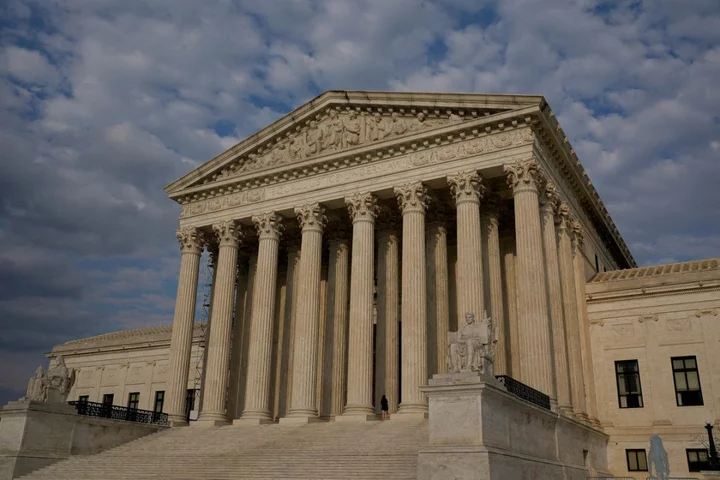
Supreme Court rejects fringe theory that could give GOP state lawmakers unchecked election authority
The US Supreme Court has shot down a fringe legal theory supported by Republican officials and Donald Trump’s allies that was invoked to toss out election results and radically reshape the nation’s elections. A 6-3 decision in Moore v Harper on 27 June determines that Republican-drawn congressional districts in North Carolina amounted to a partisan gerrymander that violated the state’s constitution, but the majority dismissed the so-called “independent state legislature” theory that fuelled the state’s arguments. Chief Justice John Roberts wrote the opinion, with support from Justices Sonia Sotomayor, Elena Kagan, Brett Kavanaugh and Amy Coney Barrett. Justices Clarence Thomas, Neil Gorsuch and Samuel Alito dissented. In oral arguments in the case last year, justices were warned that the high court’s endorsement of fringe legal theory could “sow chaos” in American democracy. The decision follows a lawsuit from a group of North Carolina voters and advocacy groups challenging the state’s Republican-drawn map of its congressional districts, which a state court rejected. Republican officials appealed to the Supreme Court arguing that the state legislature is granted exclusive power to regulate federal elections. A ruling from the justices that would uphold the GOP-drawn map would be seen as vindication for the fringe legal theory supported by many Republican officials and conspiracy theorists in their efforts to upend election outcomes and transform how the nation’s elections are run. The dubious theory – which animated Mr Trump’s spurious attempts to overturn election results in states he lost in the 2020 presidential election – could eliminate state constitutional bans against gerrymandering and other voting protections, potentially handing electoral control to Republican-dominated state legislatures that are primed to “rig” the next elections. After the 2020 presidential election, Mr Trump and his allies pressed state courts to overturn “unlawful election results” in several states he lost, based on bogus claims of fraud, and to let state lawmakers determine the outcome. All of those claims and court challenges were rejected. That fringe reading of the US Constitution went on to fuel GOP efforts to subvert election laws and change the rules of election administration across the US. In oral arguments in the case last year, US Solicitor General Elizabeth Prelogar warned that the court’s endorsement of the theory would “wreak havoc” on the electoral process and invalidate state constitutions across the country. “I’m not sure I’ve ever come across a theory in this court that would invalidate more state constitutional clauses as being federally unconstitutional,” added Neal Katyal, a former acting solicitor general under Barack Obama’s administration who argued the case on behalf of voting rights groups and Democratic voters in North Carolina. “The blast radius from their [independent state legislature] theory would sow elections chaos, forcing a confusing two-track system with one set of rules for federal elections and another for state ones,” he told justices. One reading of the theory argues that elected members of a state legislature have absolute authority to determine how federal elections – as in, elections for members of Congress and the president – are performed. State constitutional protections for the right to vote and efforts to combat partisan and racial gerrymandering could be overruled. A “nightmare” scenario could mean that a Republican-controlled state legislature that rejects the outcome of an election or objects to how it was administered – including the use of mail-in ballots or voting machines that have been subject to rampant, baseless conspiracy theories – could invoke the theory as pretext to refuse the results. Retired federal judge J Michael Luttig – who advised then-Vice President Mike Pence on 6 January, 2021 while under pressure from then-President Trump to reject the election’s outcome – has warned that the theory is a part of the “Republican blueprint to steal the 2024 election.” Dozens of briefs to the Supreme Court urged justices to reject the theory, from constitutional law experts, election officials and voting rights advocates to judges and prominent Republicans – including lawyer Ben Ginsberg, who worked on the landmark Bush v Gore case in 2000 that opened the door for the theory to take shape. Chief justices from state courts across the US wrote that the Constitution “does not oust state courts from their traditional role in reviewing election laws under state constitutions.” Without such barriers, courts will be “flooded with requests to second-guess state court decisions interpreting and applying state elections laws during every election cycle, infringing on state sovereignty and repeatedly involving the federal judiciary in election disputes,” they wrote in a filing to the court. A filing on behalf of the League of Women Voters said the theory could “throw election law and administration into disarray”. More than a dozen secretaries of state also warned that the “mistaken legal theory alien to our country’s history and this court’s precedent would have far-reaching and unpredictable consequences on our country’s elections.” The US Constitution’s election clause reads that the times, place and manner of federal elections “shall be prescribed in each State by the Legislature thereof; but the Congress may at any time by Law make or alter such Regulations.” The long-standing interpretation of that foundational clause is that election rules established by state legislatures must – like any other law – conform with state constitutions, which are under a court’s jurisdiction for review as to whether they are constitutional or not. “So if a state constitution subjects legislation to being blocked by a governor’s veto or citizen referendum, election laws can be blocked via the same means,” the Brennan Center explains. “And state courts must ensure that laws for federal elections, like all laws, comply with their state constitutions.” The Honest Elections Project, a Federalist Society-supported effort behind litigation involving state-level voting rules across the US, also supported the North Carolina case. The group invoked the fringe theory in a supporting brief filed with the Supreme Court, claiming that state legislatures are “vested with plenary authority that cannot be divested by state constitution to determine the times, places, and manner of presidential and congressional elections.” Moore v Harper “provides a timely opportunity to put these questions to rest,” according to the filing. Lawmakers in at least 38 states introduced nearly 200 bills that voting rights advocates and nonpartisan democratic watchdogs warned can be used to “subvert” election outcomes, building on a movement in the wake of 2020 elections to do in state legislatures what Mr Trump and his allies failed to do in court. The recently released analysis from the States United Democracy Center, Protect Democracy and Law Forward found that Republican state lawmakers advanced 185 bills that would make it easier for elected officials to overturn the will of their voters and make it harder for election workers to do their jobs. That total is on pace with similar efforts from previous legislative sessions. More than a dozen such bills introduced this year have been made law. Read More Supreme Court hears how the ‘blast radius’ of a radical legal theory could sow ‘election chaos’ How a fringe legal theory at the Supreme Court could blowtorch American elections Supreme Court rules Alabama discriminated against Black voters in major victory for voting rights Supreme Court rules against Navajo Nation’s access to drought-stricken Colorado River, despite US treaty Deb Haaland and Tribal leaders welcome Supreme Court decision upholding Indian Child Welfare Act
1970-01-01 08:00
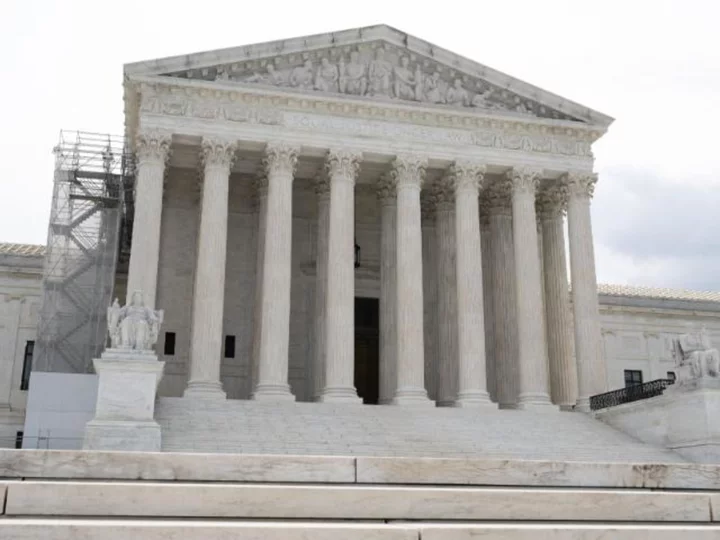
Supreme Court rejects controversial Trump-backed election law theory
The Supreme Court said Tuesday that the North Carolina Supreme Court did not violate the elections clause of the US Constitution when it invalidated the state's 2022 congressional map
1970-01-01 08:00
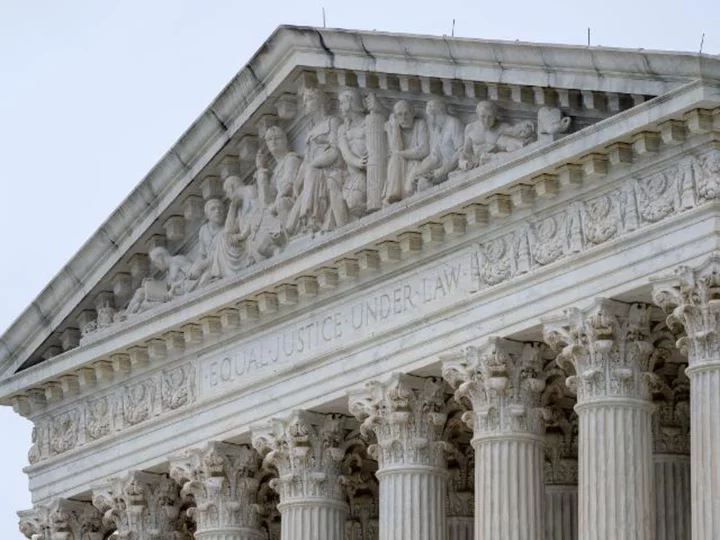
Supreme Court clarifies when online harassment can be prosecuted
The Supreme Court on Tuesday wiped away a lower court decision upholding the stalking conviction of a Colorado man who sent hundreds of messages to a woman over Facebook.
1970-01-01 08:00

Three Arrows Liquidators Seek $1.3 Billion From Fund’s Founders
Three Arrows Capital liquidators are seeking to recover $1.3 billion from the co-founders of the failed crypto hedge
1970-01-01 08:00
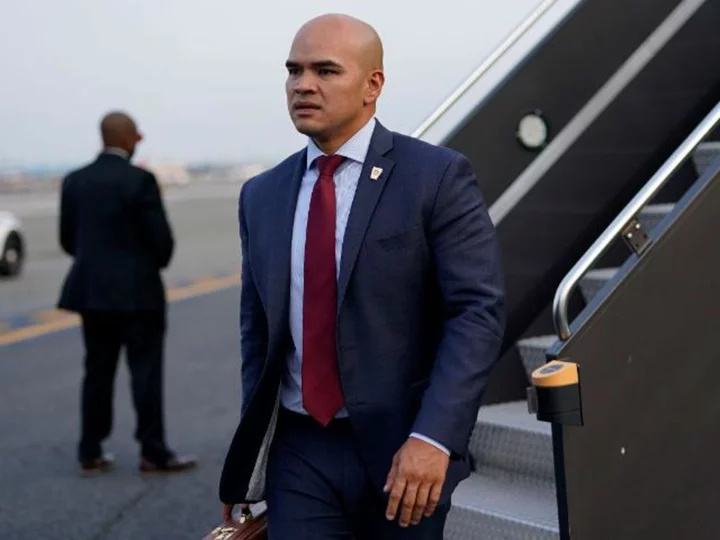
Unclear if Trump aide Walt Nauta will be arraigned in classified documents case after lawyer arrives without him
Walt Nauta, an aide charged alongside former President Donald Trump for the alleged mishandling of classified documents from the White House, was set to be arraigned Tuesday, but it's unclear now whether that will occur.
1970-01-01 08:00

Sudanese in Israel watch in anguish as Darfur violence unfolds
By Hannah Confino TEL AVIV Members of Sudan's Masalit tribe in Israel are watching in torment as family
1970-01-01 08:00

GOP leaders land top recruit in Montana Senate race as potential primary battle looms
Tim Sheehy, a former Navy SEAL and current CEO of Bridger Aerospace, announced his Senate candidacy Tuesday, setting up a potential challenge to incumbent Democratic Sen. Jon Tester and giving GOP leaders a prized recruit in a marquee race.
1970-01-01 08:00
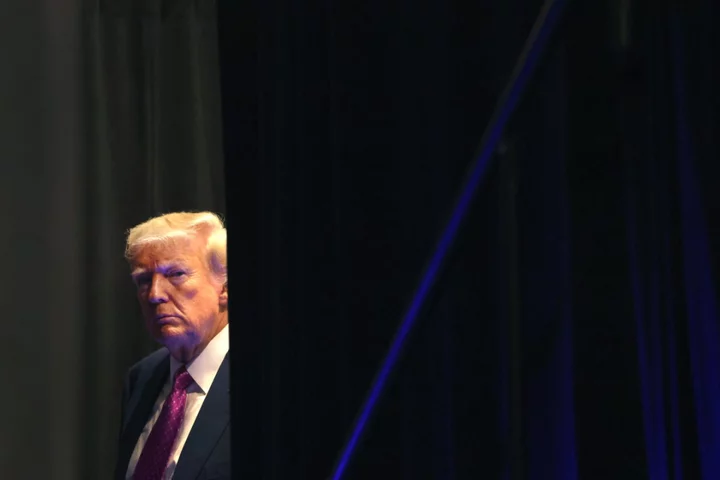
CNN plays tape of Trump appearing to show off military documents that he says are still classified
Audio of former president Donald Trump appearing to flaunt his possession of classified military documents has been broadcast by CNN. In the recording, which allegedly came from a meeting at Mr Trump’s Bedminster golf club and estate in July 2021, the former president can be heard audibly shuffling documents and describing his “big pile of papers” to associates. The existence of the tape was already known but this is the first time it has been heard in public. “These are the papers,” Mr Trump says at one point, referring to a military document concerning Iran and US military joint chief of staff Mark Milley. “This was done by the military and given to me.” “They presented me this — this is off the record,” Mr Trump is heard to say at another point in the recording, describing the information he is showing to others as “highly confidential” and “secret”. The audio records Mr Trump speaking to several people and apparently showing them documents relating to a possible attack on Iran that he says were drawn up by Gen Milley and which he himself says are still classified. The former president is heard saying: “Isn’t it amazing? I have a big pile of papers, this thing just came up. Look. [PAPERS SHUFFLING] This was him. They presented me this – this is off the record – but they presented me this. This was him. This was the Defense Department and him.” One of the other people in the room can be heard to say: “Wow.” Another says: “Oh my gosh.” Apparently referring to an ongoing public row with Gen Milley, Mr Trump is then heard to say: “This totally wins my case, you know.” He is then heard saying: “Except it is, like, highly confidential.” His guests are heard laughing as he says this. The former president then says: “Secret. This is secret information. Look, look at this. You attack, and ....” One of his guests then jokes that “Hillary would print that out all the time, you know”, referring to Hillary Clinton’s controversial use of a private email server for which she was criticised but not criminally charged. Mr Trump then says: “See as president I could have declassified it. Now I can’t, you know, but this is still a secret. Isn’t that interesting? It’s so cool. I mean it’s so – look, her and I, and you probably almost didn’t believe me, but now you believe me.” The former president was indicted earlier this month and charged with 37 counts related to his alleged mishandling of classified documents after leaving the White House, including willful retention of national defence secrets in violation of the Espionage Act, conspiracy to obstruct justice, corruptly concealing documents, concealing documents in a federal investigation, scheme to conceal, and making false statements. In May, CNN reported that among the evidence prosecutors used to build their case against the former president was an audio recording of a summer 2021 meeting, in which Mr Trump allegedly acknowledged holding onto a classified Pentagon document detailing potential battle plans against Iran. In an interview with Fox News, Mr Trump denied possessing such a document. “That was a massive amount of papers and everything else talking about Iran and other things,” he said. “And it may have been held up or it may not but that was not a document. I did not have a document per se.” He suggested the papers may have been newspaper and magazine clippings. The Independent has contacted Donald Trump for comment. It was not immediately clear how CNN had come into possession of the recording. Read More Trump news – live: Supreme Court dismisses Democratic lawsuit over Trump hotel documents Trump mocked for bursting into bizarre moaning sounds at Michigan GOP dinner Convicted Jan 6 rioter tells Trump to stop misusing her story: ‘I pleaded guilty because I was guilty!’ Rape accuser files new lawsuit as Trump seethes over 2024 flop – live Where do Donald Trump’s family stand on him running in 2024? Trump revealed to have tweeted classified image from spy satellite
1970-01-01 08:00

Pregnant workers and nursing moms have new protections on the job
Pregnant workers should have an easier time getting a stool, extra bathroom breaks or a bottle of water without fear of getting fired, thanks to a new law that takes effect on Tuesday.
1970-01-01 08:00

HDFC, HDFC Bank’s $173 Billion Merger Creates a ‘Lucrative’ Arbitrage Trade
Fund managers in India have been jumping into a “lucrative” arbitrage trade ahead of a mega-merger that will
1970-01-01 08:00
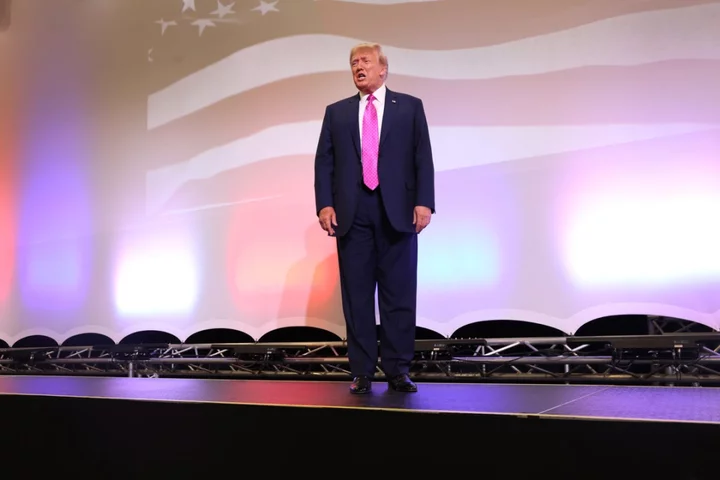
Trump news – live: Trump fumes about leaked CNN audio capturing him boasting about ‘secret’ papers
Bombshell audio has revealed Donald Trump apparently bragging about possessing still-classified military documents about Iran after he left the White House. In the recording, from a July 2021 meeting at Mr Trump’s Bedminster golf club and released by CNN, the former president is heard audibly shuffling documents and describing his “big pile of papers” to associates. “These are the papers,” Mr Trump says, refering to a military document concerning Iran. “This was done by the military and given to me.” Mr Trump took to Truth Social on Monday night to fume about the tape, railing against “Deranged Special Prosecutor” Jack Smith and baselessly accusing the DOJ and FBI of leaking it. “The Deranged Special Prosecutor, Jack Smith, working in conjunction with the DOJ & FBI, illegally leaked and “spun” a tape and transcript of me which is actually an exoneration, rather than what they would have you believe. This continuing Witch Hunt is another ELECTION INTERFERENCE Scam. They are cheaters and thugs!” he wrote. Meanwhile, the Supreme Court has dismissed a lawsuit from a number of Congressional Democrats who were attempting to get information about the government lease for the Washington, DC hotel previously owned by former President Trump. Read More CNN plays tape of Trump appearing to show off military documents that he says are still classified Judge to weigh whether Trump's New York criminal case should be moved to federal court Trump valet set for arraignment in classified documents case Fox News choose Jesse Watters to replace Tucker Carlson in primetime shakeup
1970-01-01 08:00
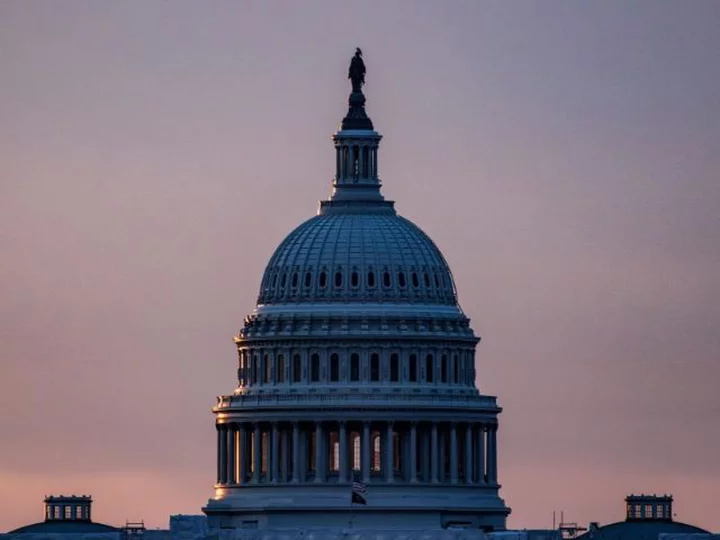
'Their plan is to literally kill people': Senate Democrats reveal new details about intel warnings ahead of January 6 attack
The January 6, 2021, attack on the US Capitol was "essentially planned in plain sight on social media" and yet the FBI and Department of Homeland Security appeared to have "completely dropped the ball," a Senate committee concluded in the latest highly critical assessment of the security failures.
1970-01-01 08:00
